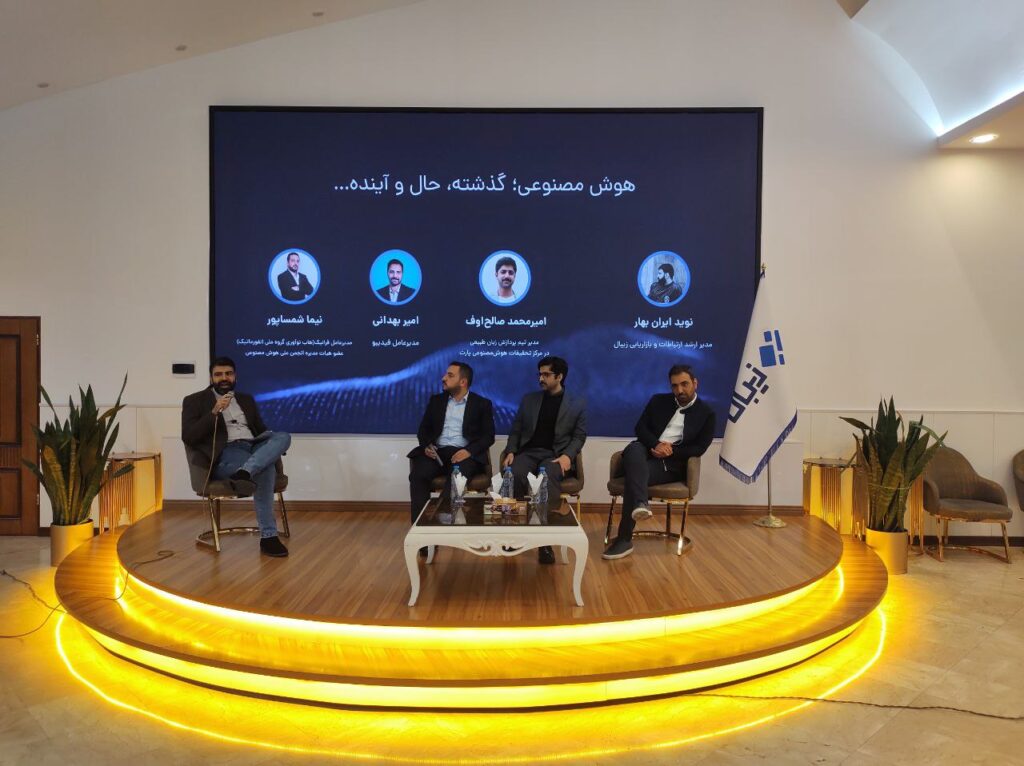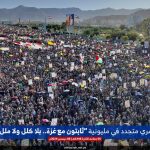The unveiling ceremony of the book “Hosh Yar” was held by Neshar Novin, Fidibo and Zibal. This event will hold a specialized panel titled “Artificial Intelligence; “Past, Present and Future” was accompanied, in which prominent experts from Iran and the world discussed and exchanged opinions.
The main purpose of this panel was to examine the current state of artificial intelligence in Iran and the world and look at the challenges and opportunities that this technology can create for countries, companies and individuals. This panel specifically addressed how to exploit artificial intelligence in various industries, including publishing, and analyzed its developments and concerns in the future.
How did advanced countries succeed in artificial intelligence?
The panel started with the words of “Nima Shamsapour”, member of the board of directors of the National Association of Artificial Intelligence. He mentioned the big and complex challenges that advanced countries were facing in the path of artificial intelligence growth and development.
Shamsapour believes: “The success of these countries, especially in the field of artificial intelligence, is the result of years of effort in investing in research infrastructure, developing technologies and creating a culture of cooperation between the public, private and academic sectors.”
He pointed out the importance of forming innovative ecosystems in which various institutions, including universities, technology companies, government organizations and even investors, simultaneously improve the level of knowledge and scientific techniques and use it to solve social and economic problems.
Shamsapour also pointed out the importance of managing and optimal use of data as one of the main infrastructures of artificial intelligence and added: “With a proper understanding of this issue, advanced countries quickly develop and use artificial intelligence in various fields and seek to use it. They are to solve complex problems such as climate change, economic crises and population challenges.
Challenges and opportunities in Iran: local potentials and limitations
In the continuation of the panel, “Amir Mohammad Salehof”, the manager of the natural language processing team at the Part artificial intelligence research center, examined the state of artificial intelligence in Iran. Pointing to Iran’s high scientific potential and manpower, Salehov emphasized: “Despite existing limitations, our country can be successful in the field of artificial intelligence. One of Iran’s biggest challenges in this field is dependence on foreign sources to provide hardware, software and data infrastructure.
He continued: “These problems become more noticeable especially in the context of sanctions and economic problems. Although Iran is facing many obstacles, it also has a lot of potential that it can exploit in the growth of artificial intelligence and its use to improve its social and economic conditions.”
He pointed to the progress made in the field of natural language processing and machine learning in the country and said: “Iran can become one of the main hubs for the production of new technologies in the region, due to the expert manpower and available scientific capacities.”
Salehof also emphasized the need to pay more attention to the creation of the necessary infrastructure for the development of artificial intelligence in the country and suggested: “Universities and research centers in Iran should have more cooperation with the private sector so that they can implement practical and practical projects in this field.” »
Artificial intelligence in the publishing industry: a new evolution in user experience
One of the interesting parts of the panel was the investigation of artificial intelligence applications in the publishing industry. Amir Behdani, the CEO of Fidibo, gave explanations referring to his company’s experiences in using artificial intelligence to improve user experience.
“Fidibo, as one of the largest digital book platforms in Iran, is continuously trying to use artificial intelligence to improve its services,” Behdani said. One of Fidibo’s important initiatives in this field is to provide a service that allows users to simultaneously listen to audio books while reading the text. This technology will create a richer user experience and allow users to interact with content in new and more attractive ways.”
In addition, Behdani pointed to other applications of artificial intelligence in the publishing industry and said: “This technology can be used in analyzing user behavior, predicting their interests and needs, optimizing book pricing processes, and even improving the quality of translations.”
Behdani particularly emphasized the importance of data analysis to better understand users’ needs and provide appropriate suggestions. He added: “Artificial intelligence can allow publishers to produce content that has the greatest impact on audiences based on more accurate data and analytics.”
the future of artificial intelligence; Opportunities and threats
One of the key topics of the panel was the future of artificial intelligence and how to exploit it in Iran and the world. In this section, Shamsapour and Salehov answered the question of what opportunities and threats await different societies in the field of artificial intelligence.
Shamsapour especially mentioned the impact of artificial intelligence in solving major global problems such as climate change, environmental crises and social inequality. He said: “This technology can play an important role in reducing energy consumption, optimizing the use of natural resources, and even helping to treat diseases.”
On the other hand, Salehov pointed out the impact of artificial intelligence on the labor market and employment and added: “Although artificial intelligence can lead to the creation of new and specialized jobs, at the same time, it will bring threats to old and repetitive jobs.”
According to him, in the future, many jobs that are somehow related to repetitive and predictable activities will be replaced by artificial intelligence systems. But these changes can lead to the creation of new and specialized job opportunities in different fields.
Legal and governance challenges in artificial intelligence
Discussing legal and governance challenges in the field of artificial intelligence, especially in Iran, was another important focus of the panel. Shamsapour pointed out this point and said: “One of the biggest challenges in the field of using artificial intelligence is the lack of clear legal frameworks.”
“For the effective exploitation of this technology, it is necessary to have laws that monitor the use of data, protect privacy and prevent possible abuses,” he said. “Without such laws, the use of artificial intelligence may face serious problems in the field of information security and violation of civil rights.”
Development of artificial intelligence in Iran: planning and necessary measures
In the continuation of the speech, one of the salient points raised in the panel was that while Iran has considerable potential in some areas such as natural language processing and machine learning, in order to improve the overall state of this technology in the country, more infrastructural measures and synergies are needed. between public and private institutions.
The experts present in the panel believed that one of the main priorities should be to strengthen the educational and research environment in the country. Iran should seek to establish advanced research centers and support startups in the field of artificial intelligence more than in the past.
One of the important points raised by Amir Mohammad Saleh was that Iran badly needs to strengthen its hardware infrastructure. According to him, many Iranian companies that operate in the field of artificial intelligence are facing serious challenges in the field of providing the necessary hardware.
“The use of powerful processors, advanced graphics cards and specialized servers can help researchers and startups build more complex models and implement larger projects,” he continued.
international cooperation; A necessity for success
Shamsapour also pointed out the importance of international cooperation in the field of artificial intelligence and said: “In order for Iran to progress in this field, it must actively participate in international projects.” These collaborations can be done in the form of partnerships with universities, research centers and foreign technology companies. “Especially in a situation where economic and political restrictions may affect some business relationships, scientific and research collaborations can be a good way to transfer knowledge and technology.”
One of the successful models mentioned in the panel was research cooperation between Iran and regional countries. Neighboring countries such as Türkiye and the United Arab Emirates, with large investments in the field of artificial intelligence and attracting foreign capital, have been able to make significant progress in this field. These cooperation models can help Iran to be more successful in the development of artificial intelligence.
Education: from yesterday to tomorrow
Another hot discussion of the panel was education in the field of artificial intelligence. Especially considering the speed of technological progress, the necessity of training and preparing future generations to face the challenges of artificial intelligence is felt more than ever. Many experts believe that artificial intelligence education should be more seriously included in different levels of education, from elementary to university.
The need to create specialized courses in universities and higher education centers is essential for training human resources specialized in the field of artificial intelligence. On the other hand, the culture of correct and intelligent use of artificial intelligence should be promoted at the level of schools and general education. These trainings should include various aspects of artificial intelligence, including its ethics and risks, so that future generations not only get to know this technology professionally, but also have a proper understanding of the challenges and issues surrounding it.
Future vision
In the end, Navid Iran Bahar, Zibal’s senior director of communications and marketing, as the moderator of the panel, summarized the topics and emphasized that more cooperation between the public, private and academic sectors is necessary for success in the field of artificial intelligence.
He emphasized the need to create research infrastructures, support startups and develop educational and research centers at the world level: “Iran can take effective steps towards solve the major problems of the country.”
RCO NEWS


















